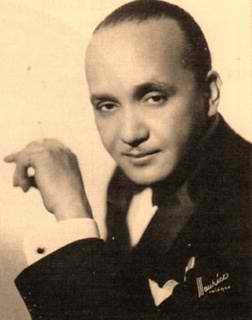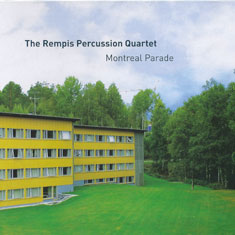Home » Jazz Articles » Jazz That Scratches, Swings and Pops » Love Is Just Around The Chorus
Love Is Just Around The Chorus

That most broadcast work was surely, in [Artie Shaw's] words, "boring, mind- numbing garbage" is more than substantiated by a photograph recently unearthed by the Institute of Jazz Studies, at Rutgers University. It shows an orchestra led by veteran saxophonist Bennie Krueger...it's the brass, in the back row that catch the eye. Trumpeters Charlie Margulis and Manny Klein and trombonist Jack Jenney are playing their horns backward, left-handed and perfectly deadpan, while Krueger, none the wise stands in front, his back to them. The message comes across loud and clear.
This little practical joke speaks to a huge divide between passion and a paycheck. Even the most innovative, exciting soloist has bills, and opportunities to earn a living from the music you enjoyed were even fewer and far between in jazz's formative years. Technology and a post-Coltrane universe have spoiled contemporary listeners into expecting dozens of choruses (recorded in pristine digital sound, no less) from their favorite musicians. Yet even the moldiest of figs accepts that "hot" didn't always equate with "paid" or "recorded."
Most early jazz pioneers earned their daily bread in commercial bands, where jazz was usually reconciled to an eight bar solo or half chorus. The juxtaposition of these individual asides with the ensemble whole illuminates what made jazz such a revolution in American music. Collectors and aficionados happily wade through trite vocals, quacking brass and saccharine strings just to hear the band's "hot man" play his way into the future. The infrequency of these moments makes them all the more magical.
As a public service from All About Jazz, we'll save you some time and spotlight just some of these incredible moments. The source material isn't as sophisticated, but whether its Bachian fugues or Indian ragas, jazz has never been afraid to set up shop in different locales. In some cases the visit is little more than a few seconds. Occasionally someone in the recording booth fell asleep long enough to really let the band cut loose. Regardless of setting or duration, the musicians clearly relished breaking away whenever they could.
 "Go Long Mule," Fletcher Henderson and His Club Alabam Orchestra
"Go Long Mule," Fletcher Henderson and His Club Alabam OrchestraBy 1924,

Fletcher Henderson
arranger1897 - 1952

Louis Armstrong
trumpet and vocals1901 - 1971
"She's A Great, Great Girl," Roger Wolfe Khan and His Orchestra
The good-natured bounce that starts this tune makes a nice compliment for some lady, but

Jack Teagarden
trombone1905 - 1964

Joe Venuti
violin1903 - 1978
"I'll Fly to Hawaii," Gowan's Rhapsody Makers
Maybe the early jazz equivalent of "Louie, Louie." We'll never know why
Brad Gowans
b.1903"In My Merry Oldsmobile," Jean Goldkette and His Orchestra
The wild collective shout that closes this orchestrated advertisement reveals a band eager to steal the car and go out for a joyride. Witnesses describe

Jean Goldkette
b.1899
Frankie Trumbauer
saxophone1901 - 1956

Don Murray
b.1904
Bix Beiderbecke
cornet1903 - 1931
"You Took Advantage Of Me," Paul Whiteman and his Orchestra
Bix Beiderbecke could have been the lead in a reality TV show about creative musicians getting swallowed up into imposing professional bands. Historians and scholars can debate how fair or unfair

Paul Whiteman
composer / conductor1890 - 1967
"Dreaming the Hours Away," Clarence Williams' Jazz Kings

Clarence Williams
bass, electricb.1893
Buster Bailey
clarinet1902 - 1967
"Wherever There's A Will There's A Way" McKinney's Cotton Pickers
Dated and disgusting name aside, this band was widely admired among musicians for its precision, sophisticated arrangements and quality soloists. They plays this cute pop confection with a lighthearted strut, and
Sidney DeParis
b.1905
Don Redman
arranger1900 - 1964
"My Pretty Girl," Jean Goldkette and His Orchestra
Beiderbecke again, this time leading the horn section in a battle cry meant to blow the doors off this souped-up stock arrangement. Turning an otherwise unremarkable pop song and into a no-holds barred stomp is a tribute to jazz's ability to make diamonds out of coal. Spiegle Wilcox's earnest trombone parodies how more vanilla bands might have handled this tune, with playful clarinet obbligato nipping at his heels. A sax break signals the end of the joke, and

Steve Brown
guitarTags
Jazz That Scratches, Swings and Pops
Andrew J. Sammut
United States
Fletcher Henderson
Louis Armstrong
Jack Teagarden
Joe Venuti
Brad Gowans
Jean Goldkette
Frank Trumbauer
Don Murray
Bix Beiderbecke
Paul Whiteman
Clarence Williams
Buster Bailey
Sidney de Paris
Don Redman
Steve Brown
Comments
PREVIOUS / NEXT
Support All About Jazz
 All About Jazz has been a pillar of jazz since 1995, championing it as an art form and, more importantly, supporting the musicians who make it. Our enduring commitment has made "AAJ" one of the most culturally important websites of its kind, read by hundreds of thousands of fans, musicians and industry figures every month.
All About Jazz has been a pillar of jazz since 1995, championing it as an art form and, more importantly, supporting the musicians who make it. Our enduring commitment has made "AAJ" one of the most culturally important websites of its kind, read by hundreds of thousands of fans, musicians and industry figures every month.




 Buy Now
Buy Now

















